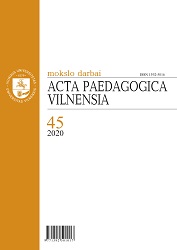Metamokymasis: koncepto analizė
Meta-Learning: Concept Analysis
Author(s): Jovita Matulaitienė, Lina KaminskienėSubject(s): Epistemology, Philosophy of Mind, Cognitive Psychology, Psychology of Self, Methodology and research technology
Published by: Vilniaus Universiteto Leidykla
Keywords: metalearning; metacognitive learning; self-learning ability; self-directed learning; self-management; self-efficacy;
Summary/Abstract: Meta-learning, a contemporary learning paradigm, will be analysed in this article. This study aims to analyse and conceptualize the definition of metalearning, to provide evidence for the application of metalearning to learning, and to single out and name the features that allow the development of metalearning in the context of selfdirected learning. To reach this goal, the concept model of Walker and Avant, involving a theoretical analysis of the concept, was selected. To reveal the theoretical concept of metalearning, the analysis of scientific publications of Lithuanian and foreign authors in the field of education and training was performed, using data collection and data analysis methods. The analysis of the concept of metalearning allows us to state that metalearning is not possible without self-regulation (self-control, self-awareness, self-reflection), reflection, independence and responsibility. Metalearning competence includes the intrinsic motivation and conscious cognitive activities of the learner; it seeks to understand and manage their thinking processes, it understands memory processes, selects the best learning methods according to the existing conditions and circumstances, organizes an optimal learning environment in the learner community, and, finally, directs the learner toward a positive experience in the process. Metalearning is complex learning that includes the integration, selection, and application of individual needs, opportunities, and teaching strategies. It emphasizes successful, perceptual learning, the application and continuous pursuit of existing knowledge, personal qualities, self-motivation, and reflection. According to Mylona (2012), the weakness and lack of empirical research on meta-learning is a consequence of the lack of focus on existing systems to clearly define all constructs that would be more actively involved in metalearning and help overcome emerging learning challenges.
Journal: Acta Paedagogica Vilnensia
- Issue Year: 2020
- Issue No: 45
- Page Range: 184-202
- Page Count: 19
- Language: Lithuanian

